Conventional vs. Synthetic Blend vs. Full Synthetic (Differences Explained)
The importance of quality motor oil cannot be overstated. But choosing the right oil for your vehicle can be confusing with all the options on the market today. Should you opt for conventional, synthetic blend, or full synthetic?
Here we’ll break down the key differences between these three major oil types. You’ll learn about each of their characteristics, typical oil change intervals, average cost, and at what point it makes sense to switch to a different type of oil.
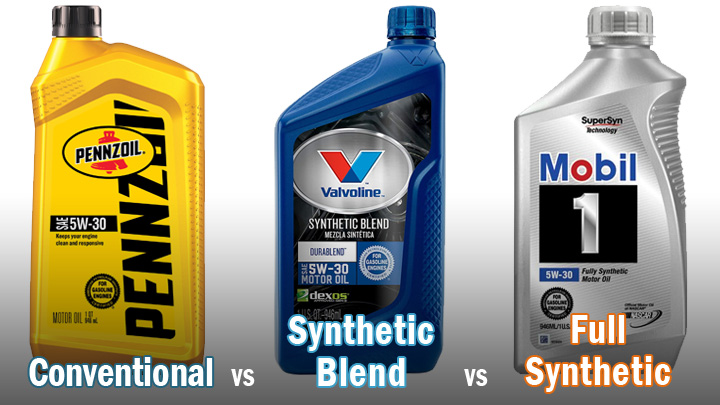
Related: Top 10 Places to Buy Motor Oil
In this article we will examine the three different types of motor oils that you can select from for your vehicle’s first and subsequent oil changes. We will learn which of these types might be the best choice for your car and driving conditions.
In all cases, if your car’s manufacturer so states, use the oil brand, type and viscosity rating he recommends. In particular, if he provides a specific oil specification for your car, make every effort to use that type of oil. The type of oil used will not affect how long it takes to change it.
Look for the specification information on the label of the oil you purchase. The folks who built your car will know best how to prolong its life. Check out your owner’s manual for this information.
More about oil viscosity and the benefits of selecting what’s right for your vehicle can be found here.
Conventional Motor Oil
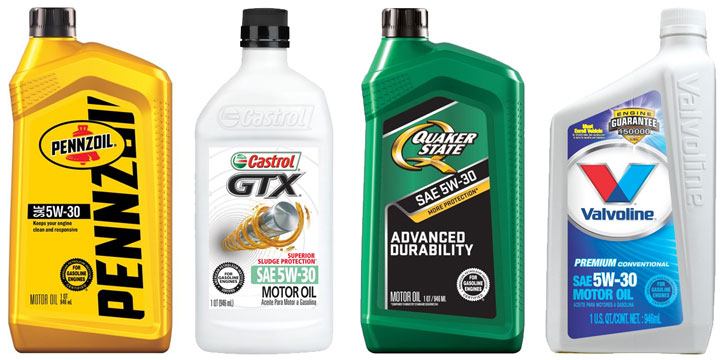
The conventional (non-synthetic) oils offered today are highly developed lubricants tested and proven over many decades. As such these oils can work perfectly well for the average car and driver.
Characteristics
Such lubricants are refined from crude petroleum stocks and then bolstered with a number of different additives. These additives help to keep internal engine parts clean, enhance lubricity, minimize the effects of moisture, keep contaminants in suspension and help the oil retain its viscosity over time.
Each of the major oil brands (e.g., Valvoline, Pennzoil, Castrol, Mobil, Shell, Amsoil, Redline, etc.) will have their own unique blend of additives. For this reason you may find a certain brand or brands that provide better fuel economy or quieter engine operation. Do not hesitate to take advantage of this knowledge.
Read Also: How to PROPERLY Check Your Oil
Between oil changes, replenishing with the same brand installed at that last change is best. However, occasionally adding a quart of an alternate brand will not materially damage your engine.
Conventional oils do have some disadvantages compared to synthetic blends or full synthetic oils. The variable viscosity in a multi-viscosity oil like SAE 10W-30 or 10W-40 will gradually degrade. Over time this oil will perform more like an SAE 15 oil due to shearing of the oil molecules during engine operation.
Other disadvantages include: engine fuel economy may be poorer; buildup of carbon and sludge deposits may take place and during extremes of engine operation accelerated wear of dynamic components may occur. This especially applies if you live in an area with exceptionally high summer temperatures.
Average Cost
The primary benefit of conventional oil is that it is the lowest in cost of all the motor oils. Pricing can range from about $3.00 to $7.00 per quart. Prices may be slightly lower online or at discount department stores.
Typical Oil Change Interval
Because conventional oil viscosity degrades over time, the useful life of this lubricant is not particularly long. This behavior essentially limits oil change intervals to as little as 3,000 to 4,000 miles.
See Also: 10 Signs You’re Overdue for an Oil Change
Synthetic Blend Motor Oil
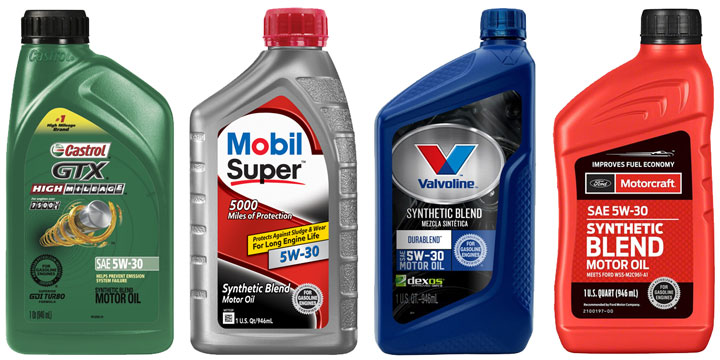
As this subheading implies, this type of oil is a blend of conventional motor oil and synthetic oil. The added synthetic oil is intended to help extend the useful oil life by improving its range of oil viscosity.
Characteristics
As with conventional oils, the blended (or semi-synthetic) lubricants include similar additives to improve oil performance. The somewhat disconcerting quality of this product is that the amount of synthetic added to the petroleum base will vary from brand to brand and may be as low as 30%.
No standards dictate the blending proportions for this product. And oil refiners closely guard their formulations. For this reason there is no concrete way to determine what you are getting for your money.
Some measure of the other synthetic benefits accrue to the blended oil. These include slightly better fuel economy; reduced risk of sludge and carbon buildup and improved high temperature performance.
Average Cost
Regarding cost, synthetic blend oils sit right in between the cheaper conventional oils and the full synthetic types. Expect to pay between $4.00 to $7.00 per quart for this type of lubricant.
Typical Oil Change Interval
With respect to oil change interval, plan to get no greater service life than you might with conventional oils. This is applicable because not knowing the blend ratio provides no guidance regarding the hope for an extended period between oil changes.
Related: 4 Common Oil Change Scams To Be Aware Of
Is Synthetic Blend Oil Worth It?
Based on the nature of this product there is little to recommend its use vs. conventional motor oil.
Full Synthetic Motor Oil
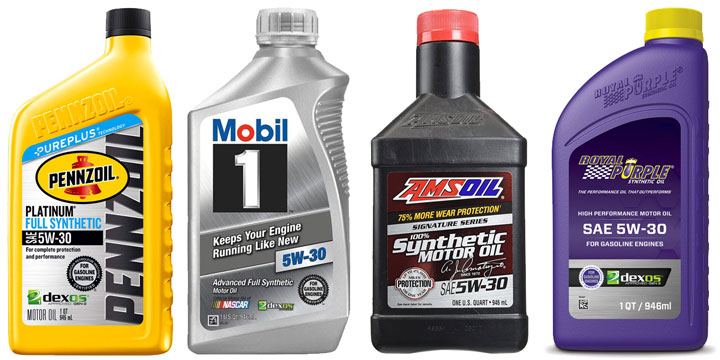
The last and most costly of the three, synthetic oil promises a host of benefits. But the ‘full synthetic’ terminology is misleading. And there are no standards regarding the refining of this lubricant.
In this respect full synthetic motor oil is somewhat similar to the blended oil discussed above.
Characteristics
Synthetic oil is manufactured in several different ways. Some synthetics use a petroleum base stock which is highly modified to enhance its qualities.
One manufacturer begins with natural gas as the base stock promising a more pure end product. Others begin with truly synthetic base stocks derived from several man-made chemical compounds.
As with the other oil types, additives enhance performance, but the synthetic qualities of this lubricant greatly benefit in four areas:
- First, these oils by nature are of lower viscosity than conventional oils. This reduces internal friction losses which enhances power and improves fuel economy.
- Second, this low viscosity characteristic is more effectively retained throughout the full temperature range of operation. Thus one blend, for example, an SAE 0W-40, can be used both summer and winter. Ease of starting in the cold, excellent cold engine lubrication and very effective lubrication at the highest of temperatures are all attained with full synthetic oil.
- Third, synthetics also are not prone to lose their variable viscosity qualities over time like conventional lubricants. They contribute to very low carbon and sludge buildup. Plus the lower viscosity greatly enhances the ability of synthetics to cool hot internal engine parts compared to conventional or even synthetic blend oils.
- Fourth, the long stable chain molecules of synthetic oils are able to sustain higher loads than conventional oils. This quality reduces internal wear adding life to any engine and may even help prevent LSPI.
The lower viscosity quality of the full synthetic oils and their enhanced slipperiness compared to conventional oils can introduce a minor problem in older engines. Thinner oil can pass through smaller spaces. Thus as a car ages, synthetic oil use can result in small oil leaks cropping up.
Some mechanics advocate switching to conventional oil if this occurs. From my perspective, occasionally wiping up a few very small puddles of oil in the garage is a small disadvantage vs. the enhanced engine life that accrues with these lubricants.
If your car’s engine is turbo-charged, synthetic oil is essential. The very high temperatures inside a turbocharger demand this oil type to avoid damage to the turbocharger’s extremely hot shaft and bearing(s).
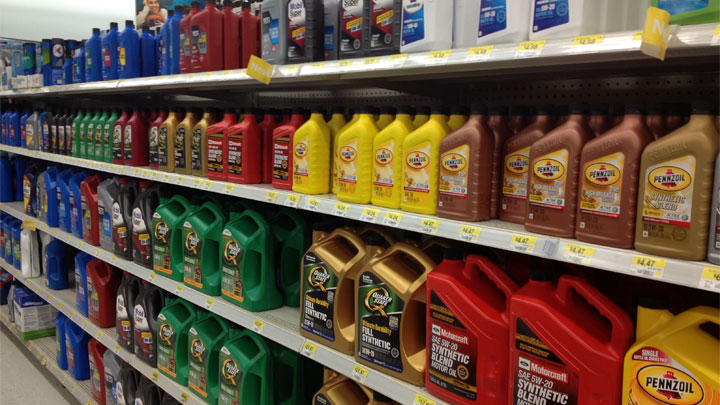
Average Cost
The cost factor will have to be considered by some. Full synthetic engine oil prices can range from $8.00 to $12.00 per quart. Online procurement may be one of the best options to keep prices low, as is purchasing 1-gallon jugs at a time.
See Also: Best Motor Oils for High Mileage Vehicles
Typical Oil Change Interval
Due to this oil’s enhanced performance, oil change intervals can be extended. Some oil manufacturers indicate intervals of up to 15,000 miles between changes are possible.
I’d suggest caution in this regard. This distance may exceed the ability of an oil filter’s capacity for contaminants.
Comfortable intervals between changes could range from 6,000 to 7,500 miles if a high capacity oil filter is also installed with each change. And if your car came from the manufacturer with full synthetic oil in the crankcase, that auto builder’s recommended oil change interval should be followed.
Is Synthetic Oil Worth It?
Hands down synthetic motor oils are far better than conventional and blended types. In every respect, engine life and performance are enhanced.
The higher cost of these oils will be offset by longer engine life. This will be an excellent payback if you intend to own your car for many years.
- DIY Car Repair Tools – Floor Jack and Jack Stands - Dec 12, 2023
- DIY Car Repair Tools – Socket (Ratchet) Wrench - Nov 9, 2023
- DIY Car Repair Tools – Torque Wrench - Apr 20, 2023

I have a 2013 Toyota Tacoma 4.0. I called Toyota about correct oil to use. They asked for the vin #. They said to manufacturer specs called for non synthetic oil. I wish that I could use oil which provides the most protection possible. They said that the thicker oil is required for valve seats and gaskets. Do I have any other options?
When in doubt, always use the oil weight recommended by the factory. It’s usually fine to switch to synthetic oil if your vehicle calls for conventional (but not the other way around). Synthetic oils generally last much longer than conventional oils.
The facts are that if your owner manual states to use synthetic oil, its only to save fuel and extend oil change intervals. This is mandated by governments. True, synthetics have slightly better friction properties. But, using good quality conventional oil with additives to support things like turbochargers, and quality filters, is all you need. The only issue is changing them more frequently. And stick to manufacturers spec on viscosity. People driving high performance even turbo charged, using quality conventional oil will easily get up too 300,000 km if maintained.
Contrary to conventional oil, a full synthetic oil breaks down much more slowly and has consistent lubrication properties throughout its service life. It is also less prone to sludge buildup and more resistant to heat. In a turbocharged application, your car needs this heat resistance to prolong the life of the turbo components. It’s best to follow the manufacturer’s recommendations if the manual calls for synthetic oil.
If my car calls for only full synthetic will it hurt my car if someone put synthetic blend in it?
When it comes to oil, it’s usually best to stick to the manufacturer’s recommendations. If my vehicle required full synthetic and someone used a synthetic blend instead, I’d change it just to be on the safe side. If you can show they made a mistake, you may be able to get them to put the correct stuff in at no charge to you.
I have a friend that was a tugboat engineer then captain. He said that after they changed to full synthetic, the engines lasted far longer between overhauls. Being as they run 24/7, that was a huge savings. But he also said that the synthetic also has better film strength and stays on the cylinders longer so for engines that aren’t used often, like mu sailboat auxiliary engine, it is even more important.
Is that all true?
I would affirm the tugboat captain’s experience. Over the years we owned two 19′ powerboats with I/O engine/drive setups. I used synthetic engine oils exclusively for these engines. The engine internals stayed spotlessly clean, and I got the synthetic’s benefit of good lubrication during that first cold start in the spring and every subsequent start after each boat sat on its trailer for a spell. More importantly, marine engines are always working under a load; no coasting down hills ever. Synthetics add engine longevity under such heavy duty conditions.
Interestingly, the second of the two boats had a Volvo-Penta outdrive. The manufacturer specifically recommended synthetic gear lube for that relatively complex gear drive system.
Have a 1966 chev. 283 that has been beef up a little with 30,000 miles on this motor using 10w30 conventional val. oil. can I go to a full Syn oil? I’m still going to change the oil at 3,500 miles. I do not drive this car a whole lot. Have antigue tags on it plus I don’t need any damage to happen.
In my opinion, I’d highly recommend to continue using conventional oil. Older cars were simply not manufactured with the tight tolerances of modern cars. Synthetic oils have different flow characteristics vs conventional and will find tiny cracks and crevices which can result in leaks.
If your car company recommends synthetic oil use it period! If your car calls for conventional motor oil, you may want to change to a synthetic blend as your car gets older due its ability to tolerate higher operating temperatures (cooling systems tend to be less efficient the older they get). Synthetic blend will lubricate better also.
I have 90,000 miles on my pickup truck and I think that the dealer has used full synthetic dexso oil in a time or two. My Question is, does it do any damage to switch back and fourth with a blend synthetic to full synthetic? Larry McEwen
It won’t do any damage. Although in my mind, a synthetic blend is not much better than a conventional oil. Either go full synthetic or standard conventional.
As you add more miles to your truck, I’d consider changing to conventional, especially if you notice any small oil leaks. The properties of synthetic oil sometimes allow it to squeeze through tiny cracks in seals/gaskets which are more common on higher mileage vehicles.
Thanks on your site, very informative, gain knowledge, U know, esp for us ladies.
Written dialog is so basic to understand, comprehend, and retain! Gigi
Man, this article…
If you have a high performance engine and your owner’s manual says you must use synthetic oil, then that’s the only thing you should put in your engine. If your manual does not, then you can pamper it with synthetic if you want.
If you live in places that see snow, this isn’t a reason to get conventional because it doesn’t get hot, this could be just as much a reason to get synthetic, because synthetics tend to flow much better than conventionals during that critical start-up in freezing temperatures.
Also, if you don’t drive long distances it’s actually worse for your oil, not better. The primary factor is not because there is a lack of heat degrading the oil, but because the lack of heat means moisture and impurities that accumulate in your oil won’t get boiled away as they should normally. Then you may want the higher quality properties of a synthetic to counteract the fact that your oil is dirtier.
But both oils will still be dirtier meaning you should just change it sooner, but then some people might conclude that the mileage longevity of a synthetic is being wasted if they are going to change it so often anyways.